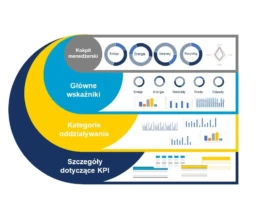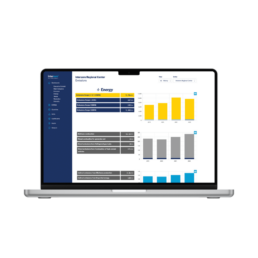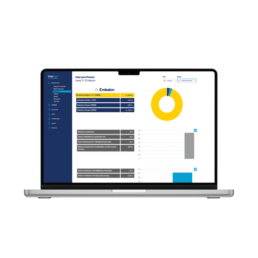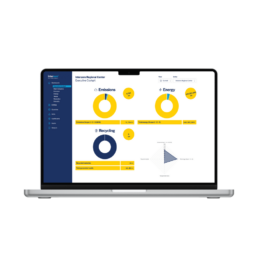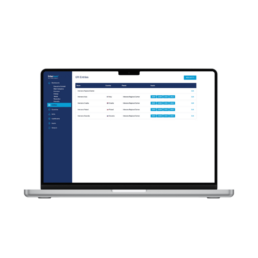Environmental Sustainability Scorecard: a tool for non-financial ESG reporting
New legal obligations for companies and the growing importance of sustainability issues are making non-financial ESG reporting increasingly difficult for many companies. To streamline the processes of data collection and ESG indicator monitoring and analysis, we have developed the Environmental Sustainability Scorecard, a consultancy service combined with an ESG reporting tool.
ESG reporting: is it also your responsibility?
The non-financial ESG reporting obligation was introduced under the CSRD. The legislation was enacted in 2022 and the from 2024, many companies will have to submit annual ESG reports prepared in accordance with the European Sustainability Reporting Standards, the so-called ESRS.
The obligation to report on non-financial ESG aspects already applies to almost 4,000 Spanish companies. In the coming years, it will be systematically extended according to the schedule below:
- from 2024, so-called public interest companies with revenues of more than EUR 50 million and employing at least 500 people,
- from 2025, all large companies or parent companies of large groups shall meeting at least 2 of the following criteria: revenue min. EUR 50 million, more than 250 employees, balance sheet total min. EUR 25 million,
- from 2026, listed medium-sized and small companies meeting at least 2 of the following criteria: balance sheet total min. EUR 5 million and revenue min. EUR 10 million for small companies or balance sheet total min. EUR 25 million and revenue min. EUR 50 million for medium-sized companies.
In the environmental area, ESG reports will include, among others, data on greenhouse gas emissions, how and to what extent the company is impacting the environment, and the status of the implementation of a circular economy.
Prepare for non-financial ESG reporting with the Environmental Sustainability Scorecard
The Environmental Sustainability Scorecard is a consultancy service that will prepare your company for mandatory ESG reporting. Our solution consists of an environmental impact assessment consultancy in relation to our client's needs, supported by an online platform.
With the Environmental Sustainability Scorecard:
- calculate your company's key environmental ESG factors for non-financial reporting,
- avoid financial penalties for non-compliance with ESG reporting obligations and reduce reputational risk for your company,
- identify in advance your company's data relevant to the environmental ESG assessment,
- You will gain time to implement measures that will improve your company's ESG rating and strengthen your market position,
- compile the data included in the ESG report into a clear digital dashboard,
- you will gain the ability to continuously monitor your company's environmental KPIs,
- report on ESG factors in a way that meets the needs of your company's investors and counterparties,
- reduce your company's impact on the environment.
Environmental Sustainability Scorecard: comprehensive ESG environmental consultancy
A key element of the Environmental Sustainability Scorecard is the advising on the process of preparing and aggregating data for the ESG report. Due to the multiplicity and degree of dispersion of this information, self-selection and collection can be time-consuming and prone to costly errors.
Interzero offers full support in understanding and applying ESG standards, as well as advice on the process of creating an ESG report: from the selection of the scope of the data to the preparation of the final document. To meet the highest reporting standards, the Environmental Sustainability Scorecard service consists of several carefully planned steps:
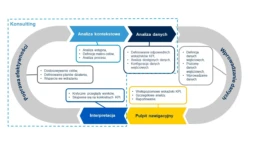
- Contextual analysis - preliminary study of the business context and the business environment,
- Data collection - collection and configuration of input data, support in the selection of environmental KPIs,
- Calculations - inputting data into the tool and producing an opening report according to the requirements of the EU taxonomy and the CSRD, and with the possibility to take into account other international reporting standards and industry guidelines,
- Evaluation of KPIs - risk mapping, critical review of results and multidimensional analysis of the company's actual environmental impact,
- Improving the company's environmental performance - elaboration of a corrective action plan, setting short- and long-term objectives,
- Support in the change process - consultancy activities, continuous target setting, environmental consultancy.
Methods for calculating ESG indicators under the CSRD
Your company's ESG and sustainability indicators are calculated by in accordance with official international standards:
- Sustainability Reporting Guidelines (GRI),
- Greenhouse gases (GHG Protocol),
- Cumulative Energy Demand (CED),
- Circularity Index (CIR). The data shall be updated according to the relevant ISO standard.
The methodology used is compatible with the requirements of the Corporate Sustainability Reporting Directive (CSRD) and the Sustainability Reporting Standards (ESRS).
In addition we include a series of KPIs tailored to the client's needs (emissions, energy, materials, waste, water).
ESD Scorecard: a digital tool for ESG reporting
An integral part of the ESD service is a digital platform that allows for monitoring of key performance indicators, monitoring of ESG factors and reporting which contains surveys of the company's non-financial data. In the dashboard of the EDS platform, you will find dynamically published KPIs that can be viewed at multiple levels (management cockpit, key indicators, impact categories, KPI details).
The ESD dashboard allows you to assign roles to employees (C-level, executives, marketing, managers, technical staff) and to define levels of access to data.
Monitor your company's ESG and sustainability indicators
The Digital Scorecard consists of charts, graphs and tables containing: key environmental KPIs, information on impact categories and detailed information on KPIs.
The data available in the tool is presented in a clear and graphical manner, which facilitates their analysis and critical review results obtained.
Create ESRS-compliant reports
From the dashboard, you can generate reports including KPIs:
- during the period of your choice,
- at group or country level,
- in .pdf or .xls format.
The scope of the report can be freely adjusted e.g. by excluding certain sections of reports for internal use or by creating a full ESG report for publication.
Grow your business with Interzero's Environmental Sustainability Scorecard Service
With the Environmental Sustainability Scorecard service, you will start making informed decisions focused on the sustainability of your company and learn how to effectively manage environmental issues. Interzero's experts will accompany you through the change process, facilitating the implementation of measures to improve your company's ESG rating.
What do you gain by choosing the Environmental Sustainability Scorecard?
- It will generate savings through the application of circular solutions and more efficient use of energy and other resources.
- You will gain new customers by expanding your portfolio of sustainable products and services,
- Engage with new business partners in compliance with ESG criteria.
- It will increase your goodwill and brand value.
- It will influence the perception of the company as a good employer, making it easier to attract and retain employees.
- It will provide your company with better access to external finance and the possibility to receive preferential terms (e.g. lower costs) for loans or credit.
- You will improve investor relations.
Why Interzero?
We are a leading provider of integrated environmental services. We have been helping companies meet their legal obligations for more than 30 years.by taking the next responsible steps in environmental protection and business development. We advise, carry out environmental audits, assume reporting obligations and prepare environmental documentation.
Our greatest asset is our qualified team of experienced specialists working in the fields of air emissions, water and wastewater management, waste management and packaging. Starting with the introduction of the ESG concept,
focus on environmental sustainability criteria company and provide solutions that improve ESG indicators in this area and have a positive impact on the company's overall ESG rating.
We have extensive experience in assessing the company's environmental impact using an international standardised methodology. In consulting, we help clients plan and implement sustainable operations and provide them with innovative digital tools that automate a range of processes and minimise the risk of errors.
In the future, our consultancy activities may
extended with "S" and "G" components which will enable effective and comprehensive ESG reporting.
Non-financial ESG reporting requirements in practice: frequently asked questions
Is non-financial reporting a new obligation for your company? Find answers to the most frequently asked questions about ESG in Spain.
ESG (Environmental, Social, Governance) is a set of indicators relating to a company's environmental, social responsibility and corporate governance issues. They form the basis for non-financial ratings and assessments of companies, countries and other organisations (e.g. NGOs).
Individual ESG indicators and a company's overall ESG assessment provide a check on whether and to what extent an organisation is committed to sustainability, applies socially responsible business practices and delivers (mainly non-financial) benefits to all its stakeholders. The analysis of a company's ESG strategy and reporting is an important element in the assessment of a company's risks, for example in merger and acquisition processes, by investors and, increasingly, by a company's potential counterparties.
An ESG report is an annual, non-financial report that provides information on a company's activities in 3 areas: environmental, social and corporate governance, and on the results of the activities carried out. A properly structured ESG report should be based on guidelines contained in a number of legal (national, European and international) and organisational acts including, among others:
- accounting law implementing the Directive on disclosure of non-financial information,
- Non-Financial Reporting Disclosure Directive (NFRD/CSRD),
- regulation on sustainability disclosure in financial services (SFDR)
- EU regulation on taxonomy,
- recommendations of the Task Force on Climate-related Financial Disclosures (TCFD).
The ESG reporting obligation came into force on 1 January 2024. As of that date, almost 4,000 Spanish companies have to submit mandatory annual non-financial reports. In the coming years, the ESG reporting obligation will be extended to more and smaller entities operating in the EU.
From 2024, the non-financial ESG reporting obligation was extended to large companies, so-called public interest entities or parent companies of large groups with more than 500 employees and meeting one of the following criteria: net turnover of more than EUR 40 million and/or total assets of more than EUR 20 million.
In the following years, the non-financial reporting obligation will also be extended to smaller institutions:
- from 2025, large entities or parent companies of large groups that meet two of the following criteria: more than 250 employees, net turnover of more than EUR 50 million, total assets of more than EUR 25 million,
- from 2026, small and medium-sized entities listed in the EU that meet two of the following criteria: for medium-sized companies: more than 10 employees, net turnover more than EUR 50 million, total assets more than EUR 25 million, for small companies: more than 10 employees, net turnover more than EUR 10 million, total assets more than EUR 5 million (deferable until 2028),
- from 2028, certain non-EU entities with a net turnover in the EU of more than EUR 150 million and with a branch in the EU with a net turnover of more than EUR 40 million or a subsidiary in the EU subject to the CSRD.
ESG indicators (also known as ESG factors) can be divided into 3 main areas: environmental, and corporate governance.
Examples of ESG environmental factors include
- climate change mitigation,
- adaptation to climate change,
- protection and sustainable use of inland and marine waters,
- moving towards a circular economy,
- pollution prevention and control,
- protect and restore biodiversity.
Examples of ESG social factors include:
- working conditions,
- health and safety at work,
- inclusion and diversity in the workplace,
- development and training opportunities,
- the level of respect for human rights,
- community relations,
- the impact of the company/brand on consumers and end-users.
Examples of ESG factors related to corporate governance include:
- corporate culture and responsible business conduct,
- the use/operation of corruption and bribery,
- the company's political influence and lobbying activities,
- relations with suppliers and business partners,
- privacy and data security.

